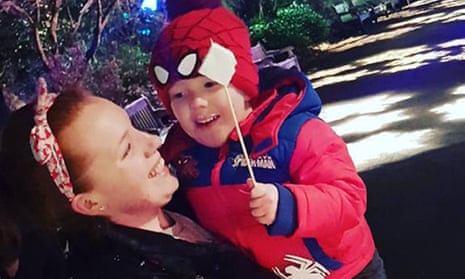Social workers need to be more sceptical and decisive when confronted by “manipulative and deceitful” parents, one of the UK’s leading child protection experts has urged following the torture and killing of Arthur Labinjo-Hughes at the hands of his stepmother and father.
Martin Narey, a former head of children’s charity Barnardo’s and senior government adviser, said social services should view potentially abusive parents “more critically” and not shy away from taking children into care.
Six-year-old Arthur from Solihull, West Midlands, was poisoned, starved and beaten during a campaign of abuse by stepmother Emma Tustin, 32, and his father Thomas Hughes, 29, during the weeks leading up to his death.
On Friday, Hughes was sentenced to 21 years after being found guilty of manslaughter. Tustin was sentenced to life in prison with a minimum term of 29 years.
On Saturday, the Attorney General’s Office said that the jail sentences of 29 years and 21 years, respectively, were to be reviewed to “determine whether they were too low”. The AGO has 28 days from the date of sentence to review a case, assess whether it falls under the Unduly Lenient Sentence scheme, and make a decision as to whether to refer a sentence to the Court of Appeal.
A spokesperson said: “The attorney general’s thoughts are with those who loved Arthur. I can confirm that the sentences given to Emma Tustin and Thomas Hughes have been referred to the attorney general for review to determine whether they were too low.”
Police bodycam footage, recorded moments after Tustin had inflicted the final fatal injuries, shows the unemployed mother of four repeatedly lying to cover up the schoolboy’s prolonged torture.
Yet social workers, notified by Arthur’s grandmother of bruising to his shoulders, found “no safeguarding concerns” after visiting the boy two months before he was murdered. One believed Arthur was “very happy”.
Narey, who has advised the government on adoption and other children’s issues, including the reform of social work education, said: “Social workers do an outstanding job generally, but some of them need to have more scepticism when they’re dealing with parents who are manipulative and deceitful.”
He added that Arthur’s death exposed flaws in the current approach of social services, which, he said, placed an onus on working with parents instead of ensuring the child’s safety, if necessary by taking them into care.
“One of the flaws is that everyone believes that taking a child into care is a negative step. Because the children in care are, for example, performing badly educationally. But that’s just a profound misunderstanding of what’s happening. Those children do badly in education and other areas because they’ve been neglected at home.
“The evidence shows that for children who are in need, care has a positive effect,” said Narey, also a former head of the Prison Service in England and Wales and special adviser to Michael Gove when he was education secretary.
Wendy Thorogood, director of the Association of Child Protection Professionals, also appeared to echo Narey’s call for greater awareness by social workers about the potential harm posed by manipulative parents.
The child protection expert said: “I can’t comment on what they [the social workers] actually witnessed, but you have to remember he [Arthur] was at the hands of quite cruel people who could manipulate him, his environment and professionals.” She said that Arthur should have been a top priority for social services, but was somehow “missed”. Thorogood told Times Radio: “You would have expected them to actually look at his history, but unfortunately they go on what they see at the moment in time.”
Meanwhile, Lord Laming, who led the public inquiry into the death of Victoria Climbié and reviewed the case of baby Peter Connelly, also called for changes to the system, stating that the training for social workers should be reviewed in the wake of Arthur’s murder. “I think the quality of the training of social work needs to be looked at again,” he said.

Laming also warned that the financial cuts of the past decade had taken their toll. “The marked reduction in funding of local authorities in the last 10 years has had a real withdrawal from frontline services, and it’s become something of a crisis service, rather than a preventative service.
“The whole organisation ought to focus on the frontline, on what’s happening to children, and making sure they intervene earlier rather than later and when it’s too late,” Laming told the BBC Radio 4 Today programme.
David Jamieson, former West Midlands police and crime commissioner from 2014 to 2021, also said austerity had squeezed frontline public services in the region and that any lessons learned from the circumstances around Arthur’s murder ought to reflect that.
An independent serious case review is looking into the case, particularly why at least three warnings from family members and teachers about Arthur’s welfare were ignored.
The review is also likely to investigate the possible impact of lockdown, with Arthur’s abuse escalating after he and his father – who had sole custody after his mother was jailed two years ago for stabbing her partner to death – moved into Tustin’s home in March last year when Covid restrictions were first introduced. Coventry crown court heard how the couple orchestrated a “campaign of cruelty” in which the boy was isolated, forced to eat salt-laced meals and suffered 130 injuries.
Tustin, 32, inflicted an unsurvivable brain injury on Arthur at her Solihull home on 17 June last year.
Hughes, 29, a labourer, sent a text to Tustin 18 hours before the fatal assault that read: “Just end him.”
Mr Justice Wall told the court that neither defendant had shown remorse and that their actions were “spiteful and sadistic”.
Tustin’s own two children, he said, “lived a perfectly happy life in that house” yards from where Arthur was subjected to “unthinkable abuse”.
CCTV from inside the couple’s home released by West Midlands Police on Friday shows them eating ice-cream as Arthur starved out of sight.
Tustin has never revealed her motive for torturing and killing Arthur. She carried out the fatal assault while in sole care of Arthur, taking a photograph of the child on her phone as he lay dying, then sending the image to Hughes.








